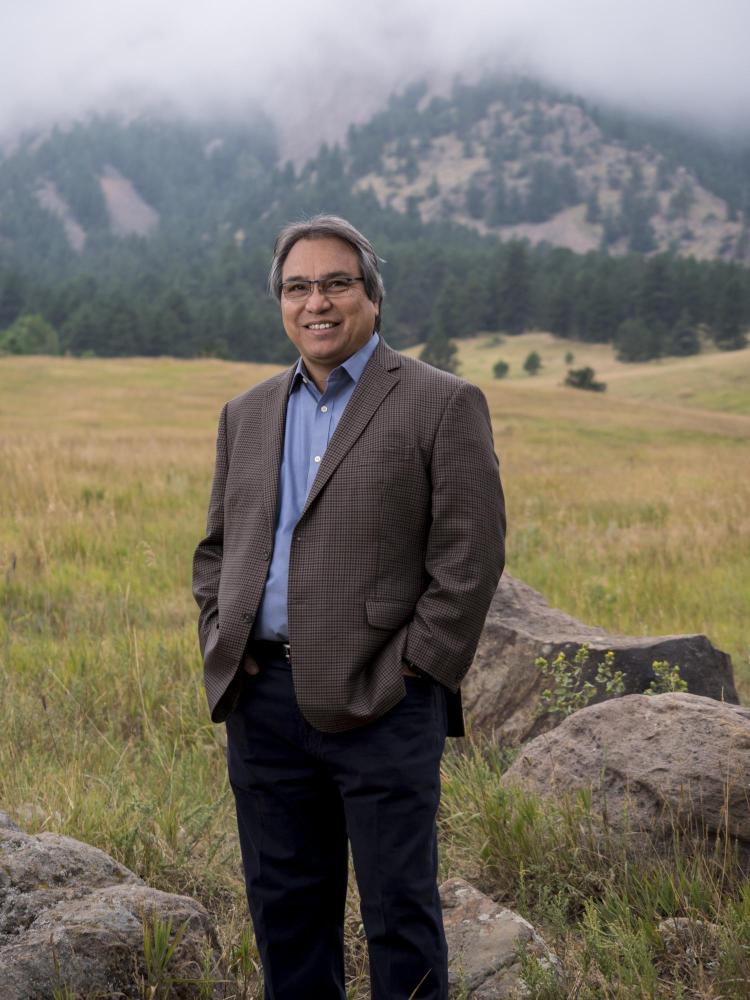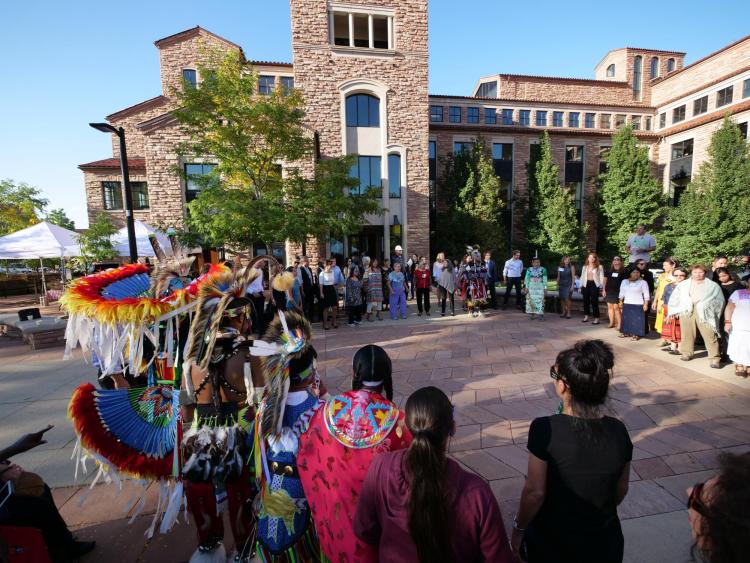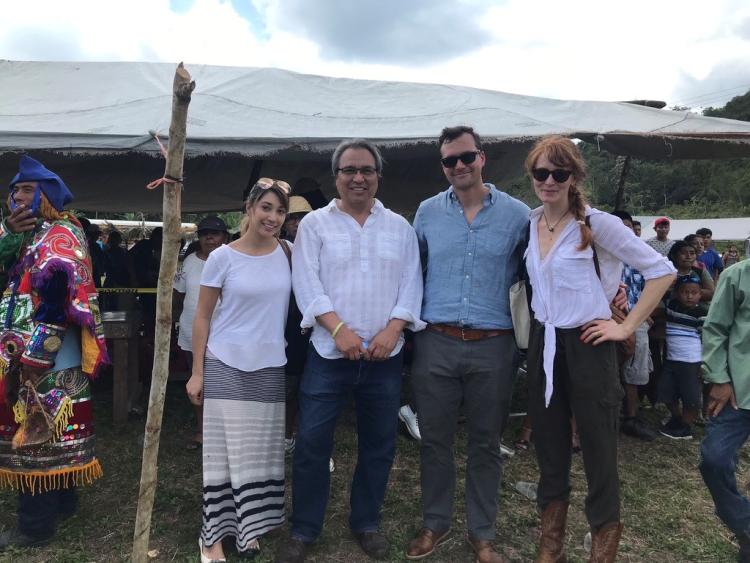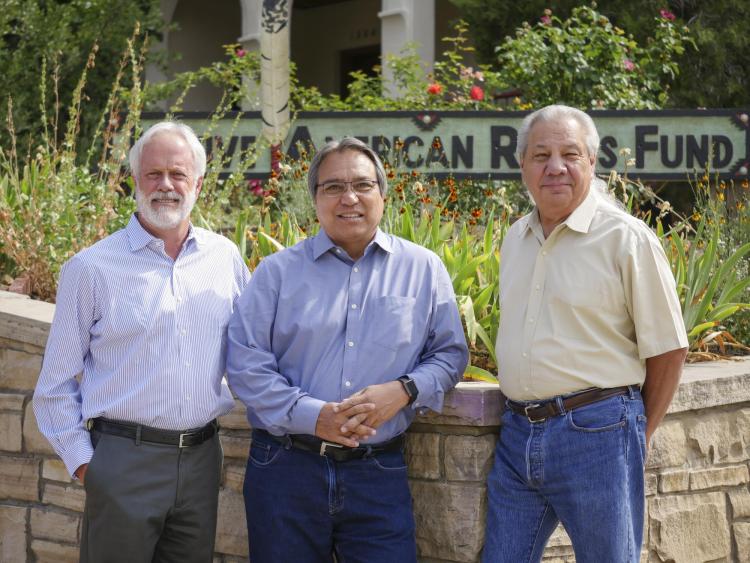The Exit Interview: Dean S. James Anaya
This July, S. James Anaya will continue as a member of the faculty and Colorado Law will welcome a new dean. Here, Dean Anaya discusses his impressions from his time as dean, future research and scholarship, and lessons learned.

As dean, you’ve championed efforts to make Colorado Law more diverse, inclusive, and accessible for students from the full spectrum of economic, social, and cultural backgrounds, including by establishing the Leaders in Law and Community fellowship program and launching the Anti-Racism and Representation Initiative. Can you reflect on the significance of these efforts, and explain why you think it’s so important that Colorado Law reflects the diversity of our state and country?
We cannot fully implement our educational, research, and public service missions without a diverse and inclusive community of students, faculty, and staff. A Colorado Law education is more complete with a learning environment that is nurtured by the experiences and perspectives of diverse backgrounds and identities, especially those that have been marginalized. In welcoming each year our first-year students, I’ve urged each of them to make an effort to get to know students from backgrounds truly different from their own, promising not just enduring friendships but also lifelong enrichment. By working to enhance greater diversity among our students, furthermore, we are contributing greater diversity in the legal profession, which is much needed. If the profession, including lawyers and judges, continues to inadequately reflect the identities of all of those it serves, it will continue to fall short.
We established the Leaders in Law and Community (LILAC) fellowship program, which provides full tuition scholarships and other support for a number of students each year, as a leading component of our diversity and inclusion efforts. The students in the program are from underrepresented backgrounds or have overcome significant obstacles in their path to law school.
A commitment to diversity is about deliberate efforts—such as the LILAC program—to be inclusive of those from backgrounds that have been underrepresented in legal education and the profession because of barriers, especially those grounded in discrimination, that have impeded success. And it includes a resolve to both defeat and correct those barriers by enhancing representation of students of color and others from marginalized groups.
Diversity among our faculty and staff is important for similar reasons, as well as to better provide for an environment of inclusion for our students. Our students cannot easily have a sense of belonging if they do not see themselves represented among the faculty that teaches them or the staff that serves them. Diversity is also necessary for our research and public service activities to generate a diversity of perspectives and to address the range of concerns of all of those we serve.
With the events of last spring and summer that brought on greater awareness of persistent racism, our diversity and inclusion efforts led to our Anti-Racism and Representation Initiative. The initiative includes a series of objectives and steps to align learning and service at the law school with a commitment to confront the manifestations of racism in society and to enhance inclusion of those from groups that have been underrepresented in legal education and the legal profession. As I said in announcing the initiative, “As educators of future lawyers who will have important roles in society that will inevitably bear on issues of equality and racial justice, and with our public service mission, we have a special obligation to work to embed anti-racism in the legal education we provide, and to confront racism and inequality in society in every way we can. We also have an obligation to be fully inclusive of those from groups that have endured racism and its continuing effects or that are otherwise marginalized.”

Members of the Colorado Law community participate in an Indigenous cultural celebration at a September 2017 event marking the 10th anniversary of the adoption of the United Nations Declaration on the Rights of Indigenous Peoples.
What other accomplishments as dean brought you the most satisfaction, and why?
I am pleased with the initiatives we’ve taken to generate and enhance programming that connects the law school globally. Our LLM degree program, which we reestablished at the beginning of my deanship, attracts students from all over the world to study alongside our JD students. The presence of international students in the law school adds to our diversity and enriches the learning environment. We’ve established agreements with the University of Chile and University of Trömso (Norway) for students from those universities’ law schools to join our LLM program for their last year of law studies. Additionally, we’ve revived our student exchange program with the Bucerias Law School in Germany, and we’ve established a new one with Comillas Pontifical University in Spain.
I’m also proud that we’ve been able to attract official meetings of international institutions to the law school. The law school hosted a meeting of the United Nations Expert Mechanism on the Rights of Indigenous Peoples, at which the members of this body discussed and heard testimony relevant to its study on challenges faced by Indigenous people in business and access to financial services. Highly memorable was the week of official hearings of the Organization of American States Inter-American Commission on Human Rights, the first time the commission had held a session of hearings at a law school. These events brought to our community rare exposure to the workings of international diplomacy and institutions.

Dean Anaya and Colorado Law alumni Ashleigh Kaspari (’19), Daimeon Shanks (’19), and Alex Kinsella (’15) during a trip to Belize.
Several of our students are gaining direct international advocacy experience through the Maya Land Rights and Development Project, which I established with the help of talented postgraduate deans fellows, Alex Kinsella (’15) and Patrick Lee (’18). Students in the project work with Maya Indigenous leaders in Belize to advocate for the protection of Maya lands and resources through proceedings involving both international and Belizean domestic forums.
Another project of note is our partnership with the Native American Rights Fund (NARF) to advance implementation in the United States of the United Nations Declaration on the Rights of Indigenous Peoples. The law school has had a long relationship with NARF, a nonprofit national law firm based in Boulder that advocates for Indian nations. It’s been an honor for me to support and be involved with this new partnership with NARF, which, under the supervision of Professor Kristen Carpenter, engages our students in original research and innovative advocacy.
I’m pleased also to have contributed to the improvement of our physical space. We’re fortunate to have a marvelous building that is an important element of our vibrant community. When I first came to Colorado Law I noticed that the ground level of the building, which faces the east parking lot, was not what it could be. Student leaders of our law journals worked with members of our staff, architects, and contract workers to redesign the ground level into an attractive space that includes a new state-of-the-art suite of offices and lounge space for the journals, a new conference space with an adjoining kitchen and lounge, and improved library space. This level of the building, once commonly referred to as the “basement,” now more frequently is referred to as the “Garden Level.”

Steve Moore (’79), staff attorney with the Native American Rights Fund; Jim Anaya; and John Echohawk, executive director of the Native American Rights Fund.
What has it been like to lead Colorado Law through the COVID-19 crisis? What core values and guiding principles have you kept at the forefront?
It’s been highly challenging and time consuming. There’s been no playbook or precedent to draw from. We’ve had to create our own. Leading through a pandemic was nothing I expected or was prepared for. I’m fortunate to have a wonderful group of faculty and staff members who’ve been at the forefront with me in the job of ensuring continued success as a first-rate law school. I’m especially indebted to the extraordinary efforts and leadership of Associate Deans and Professors Mark Loewenstein, Amy Griffin, and Fred Bloom, and of Senior Assistant Dean Jennifer Sullivan. I also can’t say enough about our IT team, led by Jon Sibray. He and the dedicated members of his team have done herculean work to ensure the technological infrastructure and coaching on the use of the technology to enable us to continue successfully with our educational mission. I’ve marveled at how our faculty adapted quickly to teaching in the COVID environment, and at how our students have adapted their learning.
Early in the pandemic I articulated the following values to guide our adaptation to our new reality: safety and health of our students, faculty, and staff; academic and instructional integrity and excellence; inclusiveness, with constant attention to the disadvantages faced by some; commitment to the public interest; maximization of professional preparedness and employment opportunities; flexibility and adaptability. I’ve frequently returned to this list, as well as to whatever sources of fortitude I can find, including my caring wife, Jana, who’s been very busy in her own right defending against evictions as a Colorado Legal Services attorney, and, of course, my steadfast companion in those stress-reducing walks, our dog, Kay Kay.
As you turn your focus to teaching and scholarship, what topics do you hope to examine with regard to international human rights and issues concerning Indigenous peoples?
I will first be completing new editions of my co-authored coursebook, International Human Rights: Problems of Law, Policy, and Process (Wolters/Kluwar), and of my single-authored book, Indigenous Peoples in International Law (Oxford Univ. Press). I’ll then turn to a book project I’ve had on the back burner: a comparative examination of the domestic legal developments concerning Indigenous peoples, and their theoretical foundations, in select countries across the world. I may propose a new course on comparative law on Indigenous peoples based on this latter research project.
Alongside my research and teaching, I intend to return to direct involvement in outreach projects such as the Maya Land Rights and Development Project referred to earlier.
What’s one lesson you’ve learned during your deanship that you will take with you as a member of the faculty?
I’ve learned the incredible importance of the law school support staff. As a faculty member at other law schools before becoming dean at Colorado Law, I had little awareness of all that goes into making a law school run and the vital role of dedicated and talented staff. I will never take that for granted again, and as a faculty member I’ll continue to find ways to show appreciation for our staff.
What does Colorado Law mean to you?
The University of Colorado Law School is now a part of my identity. It’s been my high honor to serve as dean, and the experiences I’ve gained over the last five years will be part of me for the rest of my life.


